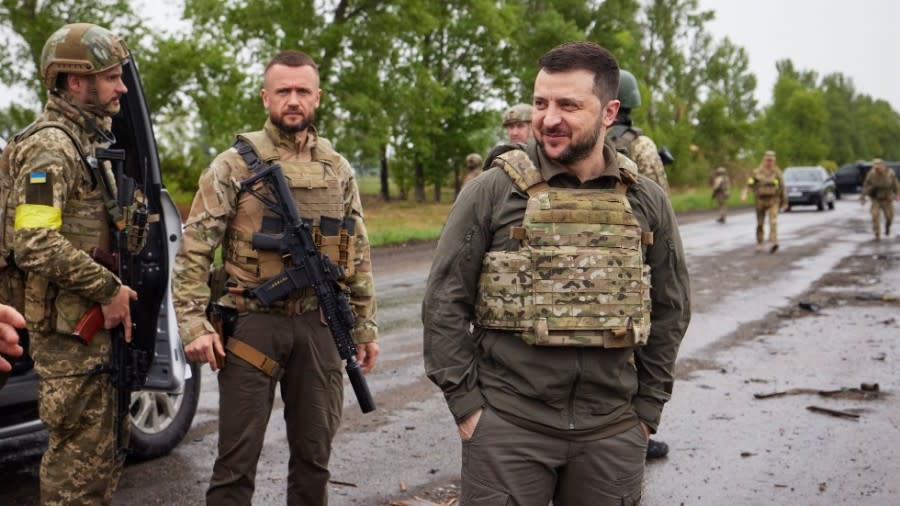
Ukraine’s battleground offensive over the weekend made major headway and clawed back thousands of miles of territory once lost to Russian forces, a development that is causing issues for Russian President Vladimir Putin at home and abroad.
We’ll break down the most recent Ukrainian gains and what that means for both Kyiv and Moscow, plus the stark new figure for the number of civilians killed during the conflict, the latest in the Department of Justices’ review of classified materials taken from Mar-a-Lago, and how President Biden shifted the war on terror.
This is Defense & National Security, your nightly guide to the latest developments at the Pentagon, on Capitol Hill and beyond. For The Hill, I’m Ellen Mitchell. Subscribe here.
Ukraine’s successful offensive bad news for Putin
Ukraine’s battleground offensive that has seen it gain thousands of miles of territory once lost to Moscow spells bad news for Russian President Vladimir Putin at home and abroad.
The Ukrainian’s performance has amplified dissent in Russia, strengthened President Biden’s hand in rallying support for the country, opened up new opportunities for Kyiv and is expected to make it harder for Russia to find support from its allies.
Counteroffensive: “Clearly they’re fighting hard,” a senior U.S. defense official told reporters on Monday of the Ukrainian troops, noting that Russian forces have “largely ceded their gains to the Ukrainians” in the vicinity of Kharkiv province with “many” of the Russian forces moving back over the border into Russia.
The Ukrainian military last week began a counteroffensive that quickly reclaimed territory and pushed Russian troops back to the northeastern border of the country in some places.
Promising results: The lightning advance forced thousands of Kremlin troops to make a quick retreat, leaving behind ammunition stockpiles and equipment, reports of abandonment which could be “indicative of Russia’s disorganized command and control,” the defense official said.
On Monday, Ukrainian President Volodymyr Zelensky said his forces had recaptured 6,000 square kilometers of land in the east and south of Ukraine since the start of September. Included in the towns reclaimed was Izium, a key city in the fight.
A possible turning point: The loss of Izium marks Russia’s worst military defeat since March, when its troops were unable to take the Ukrainian capital of Kyiv and were forced back.
For Ukraine, the rapid advance could be a turning point in the 6-month-old war that moves the fighting out of a battle of attrition.
Read the rest of the story here
MORE THAN 5,800 CIVILIANS KILLED IN RUSSIAN INVASION
Nearly 100 civilians have been killed in Ukraine so far this month, bringing the total civilian death count to nearly 6,000 since the war began, according to a new United Nations (U.N.) report on the war.
-
The U.N. High Commissioner for Human Rights released a report Monday detailing 5,827 civilians killed and another 8,421 injured in the conflict between Feb. 24 and Sept. 11.
-
This month alone, the U.N. mission recorded 96 Ukrainians killed and another 266 injured.
The actual numbers are likely “considerably higher,” according to the report, as information is hard to come by and verify in conflict-wracked areas.
Trump pushes to keep blocking DOJ access to docs
Former President Trump is fighting a request from the Department of Justice (DOJ) to allow its review of classified materials taken from Mar-a-Lago to continue, with Trump’s legal team arguing the investigation “at its core is a document storage dispute that has spiraled out of control.”
The filing continues to assert the former president has broad power to control his records even after he leaves office, even the classified records that the Justice Department argued Trump can have no possible claim to, and thus do not require review by a third-party special master.
The Trump team’s argument’: In the filing, Trump’s legal team pushed back against the idea that there was any possible damage from the mishandling of records.
-
“There is no indication any purported ‘classified records’ were disclosed to anyone. Indeed, it appears such ‘classified records,’ along with the other seized materials, were principally located in storage boxes in a locked room at Mar-a-Lago, a secure, controlled access compound utilized regularly to conduct the official business of the United States during the Trump Presidency, which to this day is monitored by the United States Secret Service,” they wrote.
Timing: The response from Trump’s team came after the Justice Department last Thursday indicated it planned to appeal a federal district court judge’s ruling green-lighting a special master, also asking her to approve a partial stay that would exclude some 300 classified records from their review.
At issue: “The classification markings establish on the face of the documents that they are government records, not Plaintiff’s personal records,” the DOJ wrote.
“And for several reasons, no potential assertion of executive privilege could justify restricting the executive branch’s review and use of the classified records at issue here.”
But Trump’s team claimed Monday that classification status matters little within the Presidential Records Act (PRA) and that Trump’s document issues should be sorted with the National Archives.
How Biden has shifted the war on terror
More than 20 years after the Sept. 11, 2001, terrorist attacks, President Biden has shifted the way America fights the war on terror by launching fewer drone strikes, embracing an over-the-horizon approach to killing terrorists in Afghanistan and leveraging alliances.
Following last year’s pullout of U.S. forces from Afghanistan — ending a war that the 9/11 attacks tipped off — Biden has placed more emphasis on working with and through allies to target both new and long-standing foreign terrorist groups.
Meanwhile, Biden is also prioritizing keeping a light footprint abroad, including by using drones and special forces. This marks a major shift from the large numbers of American service members sent overseas to fight the Iraq and Afghanistan wars, as well as to far-flung locations including Syria and Somalia.
But as the Biden administration pushes forward with its counterterrorism strategy, it will have to balance its efforts to combat foreign terrorists with addressing the threat of domestic extremism, experts say.
ON TAP FOR TOMORROW
-
The Senate Armed Services Committee will hold a hearing on the nomination of Lt. Gen. Bradley Saltzman, to be promoted to general and Chief of Space Operations, at 9:30 a.m.
-
Hudson Institute will host a virtual discussion on “Technology, Innovation, and Defending America,” with the Pentagon’s Defense Innovation Unit Director Michael Brown, at 10 a.m.
-
New America and Arizona State University will hold the annual Future Security Forum, with current and former U.S. defense and national security officials at 12:30 p.m.
-
American University’s School of International Service will host a virtual talk on “Taiwan, China, and the U.S. in the Wake of Speaker Pelosi’s Visit,” at 1 p.m.
-
The Government Executive Media Group will hold a virtual discussion on “Securing the Air Force: A Dispatch from DAFITC (Department of the Air Force Information Technology and Cyberpower)” with Air Force Deputy Chief of Staff for Strategy, Integration and Requirements Lt. Gen. Clint Hinote, at 1 p.m.
WHAT WE’RE READING
OP-ED IN THE HILL
‘Idle threats’ won’t deter North Korea, RAND warns US and South Korea
That’s it for today! Check out The Hill’s Defense and National Security pages for the latest coverage. See you tomorrow!
For the latest news, weather, sports, and streaming video, head to The Hill.




